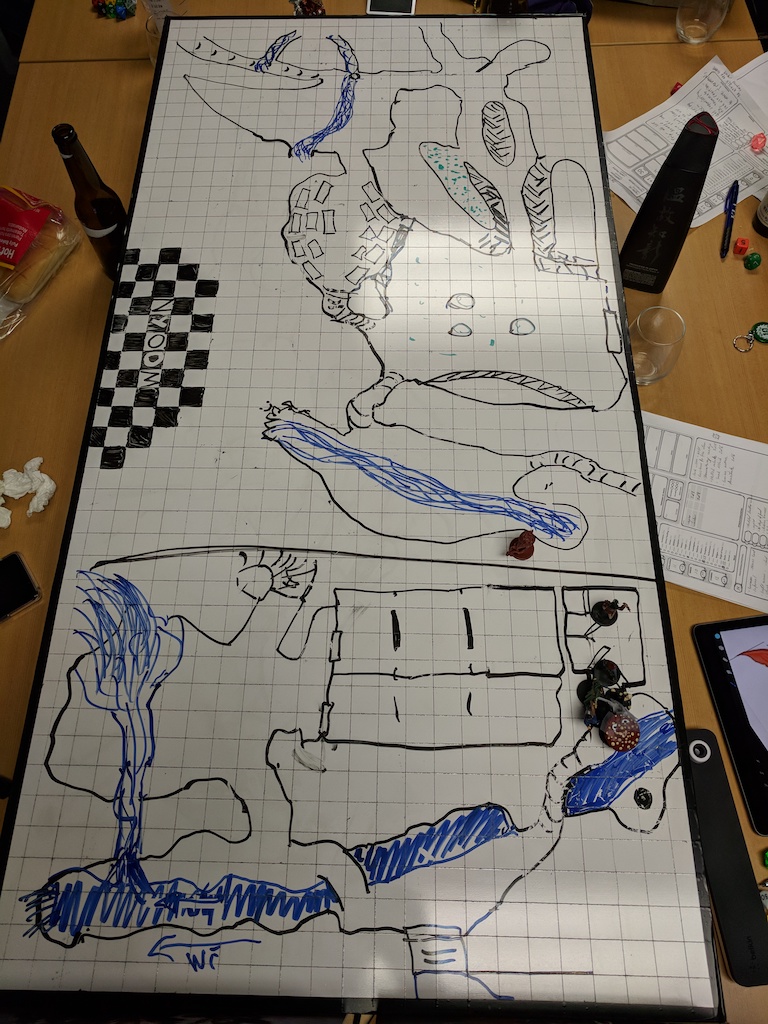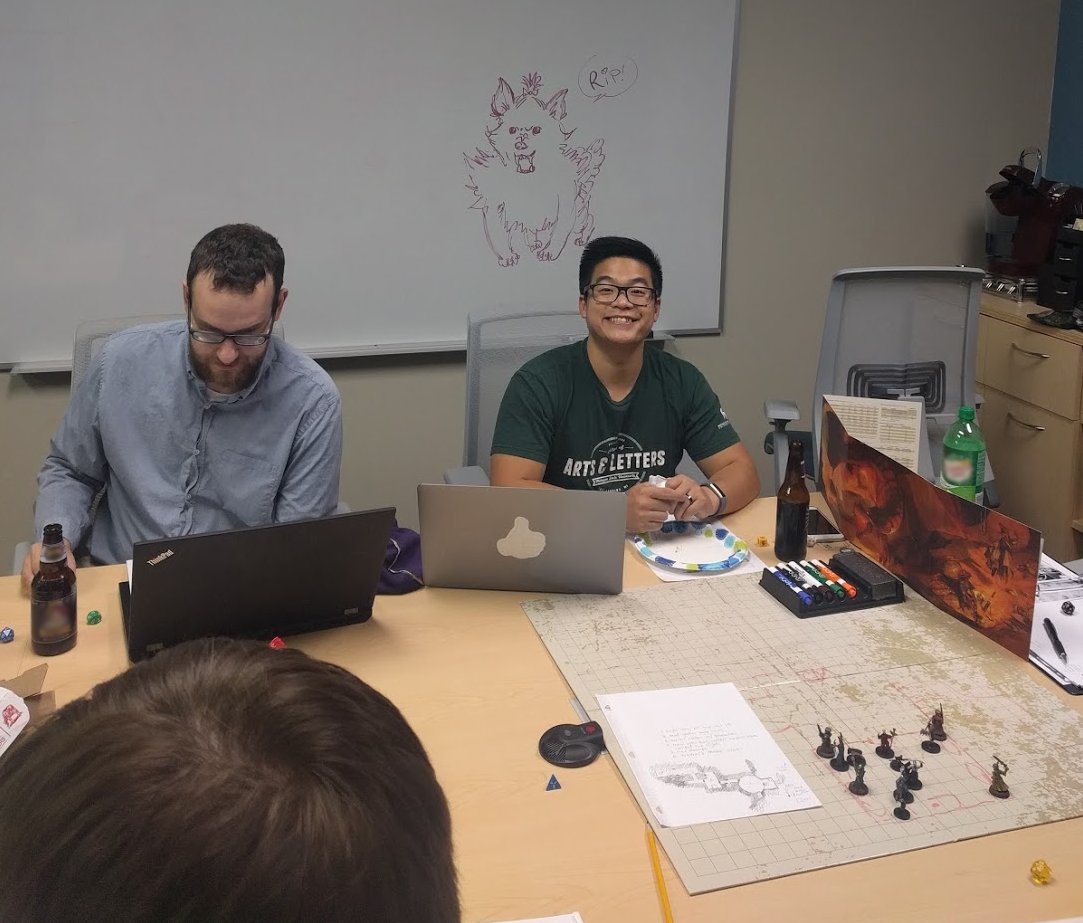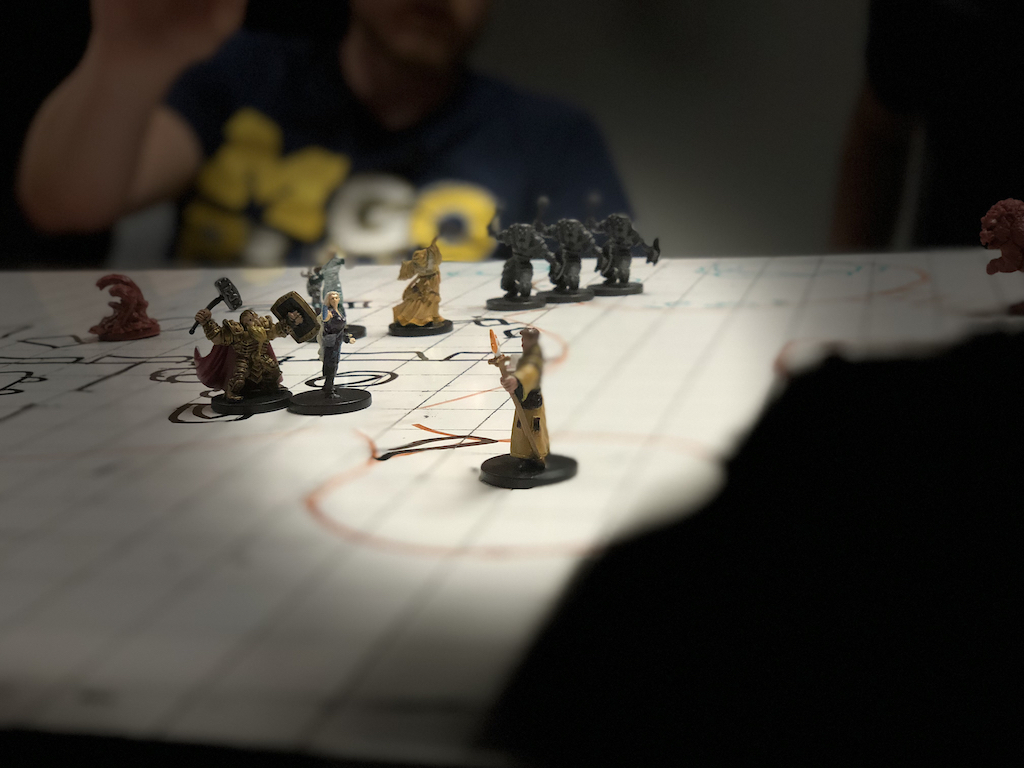Blog Barista: Tommy Truong | Aug 13, 2018 | Workplace | Brew time: 7 min
I started playing Dungeons and Dragons just under a year ago with some of my colleagues. Prior to being introduced to this game, I held the belief that it was an activity enjoyed only by the nerdiest of nerds (you can thank modern movies and television for that) and not something that I would particularly be interested in.
Boy, was I wrong.
After our Dungeons and Dragons group started the first game, known as a campaign, I was immediately hooked. How could I have gone so many years depriving myself of such enjoyment? In many ways, these late-night sessions and fictional stories have taught me more about how to be an effective professional than my actual time in the industry.
This is the tale of what I’ve learned from playing Dungeons and Dragons and why you should also start to play.
What is Dungeons and Dragons?
For those of you who were ignorant like me, Dungeons and Dragons, shortened as “D&D” or “DnD”, is a fantasy tabletop role-playing game. That description, however, is deceivingly simple.
At the beginning of a campaign, each player creates their own character (it may be inspired from themselves or completely fictional) with a set of skills, abilities and prior experiences. Over the course of the campaign, the main storyteller, known as the “Dungeon Master” or “DM”, leads the group through an adventure that challenges everyone to strategically navigate through the fictional world while reacting to both the developing story and the consequences of their actions.

What makes this game different from, say, a video game? Well, while there is a premeditated story map that guides the DM and grounds the campaign in consistency, each player is their own storyteller and their combined decisions are what ultimately molds the outcome into something that even the DM doesn’t know.
So why should your colleagues—or even you—play D&D? D&D is an experience. A practical, educational, collaborative experience. Let me explain.
There is Something for Everyone
Like I mentioned, when I first started playing D&D, I had doubts and skepticism about whether it was something that I would be interested in. Luckily, one of the beauties of this game is that it has at least one aspect that’s attractive to almost everybody.
Whether you’re a right-brained creative or a left-brained developer (if you believe in that sort of thing), you will find something that will take advantage of your skills and experiences. As a user experience designer, I found myself inspired to imagine the fanciful backstories and peculiar characteristics for my character. For my colleague, who’s a very methodical software developer, his found opportunities to practice his strategic thinking and algorithmic problem solving.
When it comes to surviving bandits and outsmarting sorcerers, it takes each and every ability to succeed. Just like a product development team, roles need to be filled and diverse experiences contribute to a better developed product.

Collaboration is Everything
Remember when I said that the combined decisions of the group contributes to the overall story? At the end of the day, it’s more than the tale that stays in players’ minds when they lay in bed at night—it’s the experience of building the adventure together with their friends that keeps them coming back.
Whether they are a recent graduate or industry mogul, professionals understand that success is never achieved in insolation. Each person’s individual experience is the result of an acculturated impact by multiple friends, mentors, colleagues and family members that they encountered throughout their life.
In order for a project to fully come together, it takes the combined efforts of those multifaceted professionals. A campaign in D&D is no different. How can an individual barbarian take on an army of orcs? How can an individual developer put together the systems that brought humanity to the moon?
Spoiler alert. Those individuals could not and, if you ask them, would not.

Improvise. Adapt. Overcome.
One of the first things I noticed when I first started playing D&D was how flexible everything is—to the point of ambiguity. No one, other than the DM, understood the world that their character was in. No one could completely prepare their character to survive the situations that their group may encounter.
This, when you think about it, is quite similar to how the real world works. An individual can only prepare themselves so much until the real world slaps them in the face and says, “you’re on to something, but keep trying because you’re going to keep failing.”
During my time in the industry, the most important lessons I have ever learned came from failure. Those situations were the instances when I challenged my preconceived notions of how things should be and changed them—grew them—-into how they will be to prepare myself for next time.
Fail early and often. When you fail, learn to understand why you failed. Pick yourself back up and fail again in even more exciting and extravagant ways.
In D&D, all players are going to have their fair share of failures. Maybe it’s a time when they should have explored a room when it appears empty. Maybe it’s a time when they should have befriended a creature instead of fighting it. No matter the failure, you just need to reflect, adapt, and prepare yourself for what’s next to come.
Fictional Security
In D&D, another perk of creating a fictional character is the unrestricted opportunity to explore different abilities and responsibilities that a player hasn’t been able to try before. But this flexibility goes beyond the chance to trial the role of an assassin rogue when they’ve frequented a wizard elf.
During my relatively brief time playing D&D, I have seen Type B people take risks, embrace conflict and make spontaneous decisions, as well as Type A people reserve actions for others, encourage peace and delegate responsibility. If you are usually a meticulous business analyst and are interested in storytelling as a project managing DM, then go for it. Are you normally a heads-down developer interested in what it is like being a charismatic, marketing bard? Go give it a try!
In a fictional world, nobody discourages you from exploring different personalities and roles. Be the person you want to be and if things don’t work out, then reflect on why and hopefully that lesson beneficially contributes towards your usual occupation.
Get Started!
So, now that you’ve learned about how awesome Dungeons and Dragons is, are you ready to become a nerd? Or maybe you’re in a management role and think this sort of exercise will benefit your team? Regardless of your intentions, I strongly believe that whoever gets involved will have a great time and will definitely take away something that positively contributes to their professional lives.
If you are ready to start your campaign, here’s how to get things rolling:
1. Learn the basic rules of D&D from their official website.
2. Learn how to organize a game.
3. Find at least three friends to play and choose one person to be your Dungeon Master.
4. Find a pre-made story to dive into from sites like DriveThruRPG or Dungeon Masters Guild (you’ll find many good free or cheap ones).
5. Start playing and adapt the style to what fits your group the best.
Vox Media made an excellent video with a more in-depth explanation of D&D and how to get started. You can view the video here.
If you’re interested in the official starter set, which includes everything that your group would need in a convenient pack, you should be able to find one at your local game store, book store or at many online retailers. Learn more about the starter set at here.
Now go on an adventure and see what you can learn!
Other recent posts:

Kunz, Leigh and Associates (KL&A) Announces the Retirement of KL&A Co-Founder John Leigh
OKEMOS, MI, April 11, 2023 – Kunz, Leigh and Associates (KL&A) announces the recent retirement of KL&A Co-Founder John Leigh as of March 31, 2023. Mr. Leigh began his career as a developer working on large mainframe systems before moving…

Team Building in a Remote Environment
Blog Barista: Dana Graham | June 15th, 2022 | Culture | Brew time: 5 min
Let me start by saying I don’t care for the term “work family.” I have a family I love, and they have absolutely nothing to do with my career. I want my work life to be its own entity. I like boundaries (and the George Costanza Worlds Theory). Certainly, I want to enjoy and trust my coworkers, and I want to feel supported and cared for…
0 Comments